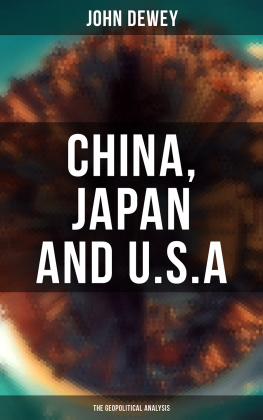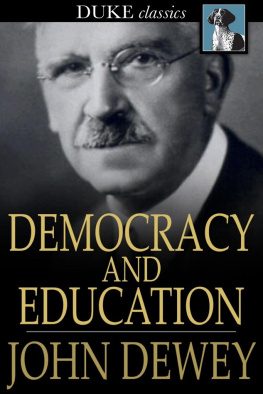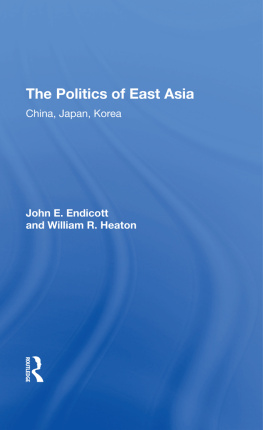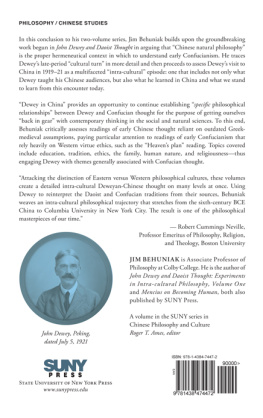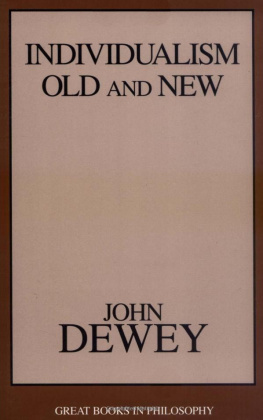I
On Two Sides of the Eastern Seas
Table of Contents
It is three days easy journey from Japan to China. It is doubtful whether anywhere in the world another journey of the same length brings with it such a complete change of political temper and belief. Certainly it is greater than the alteration perceived in journeying directly from San Francisco to Shanghai. The difference is not one in customs and modes of life; that goes without saying. It concerns the ideas, beliefs and alleged information current about one and the same fact: the status of Japan in the international world and especially its attitude toward China. One finds everywhere in Japan a feeling of uncertainty, hesitation, even of weakness. There is a subtle nervous tension in the atmosphere as of a country on the verge of change but not knowing where the change will take it. Liberalism is in the air, but genuine liberals are encompassed with all sorts of difficulties especially in combining their liberalism with the devotion to theocratic robes which the imperialist militarists who rule Japan have so skilfully thrown about the Throne and the Government. But what one senses in China from the first moment is the feeling of the all-pervading power of Japan which is working as surely as fate to its unhesitating conclusionthe domination of Chinese politics and industry by Japan with a view to its final absorption. It is not my object to analyze the realities of the situation or to inquire whether the universal feeling in China is a collective hallucination or is grounded in fact. The phenomenon is worthy of record on its own account. Even if it be merely psychological, it is a fact which must be reckoned with in both its Chinese and its Japanese aspects. In the first place, as to the differences in psychological atmosphere. Everybody who knows anything about Japan knows that it is the land of reserves and reticences. The half-informed American will tell you that this is put on for the misleading of foreigners. The informed know that it is an attitude shown to foreigners only because it is deeply engrained in the moral and social tradition of Japan; and that, if anything, the Japanese are more likely to be communicativeabout many things at leastto a sympathetic foreigner, than to one another. The habit of reserve is so deeply embedded in all the etiquette, convention and daily ceremony of living, as well as in the ideals of strength of character, that only the Japanese who have subjected themselves to foreign influences escape itand many of them revert. To put it mildly, the Japanese are not a loquacious people; they have the gift of doing rather than of gab.
When accordingly a Japanese statesman or visiting diplomatist engages in unusually prolonged and frank discourse setting forth the aims and procedures of Japan, the student of politics who has been long in the East at once becomes alert, not to say suspicious. A recent illustration is so extreme that it will doubtless seem fantastic beyond belief. But the student at home will have to take these seeming fantasies seriously if he wishes to appreciate the present atmosphere of China. Cables have brought fragmentary reports of some addresses of Baron Goto in America. Doubtless in the American atmosphere these have the effect of reassuring America as to any improper ambitions on the part of Japan. In China, they were taken as announcements that Japan has about completed its plans for the absorption of China, and that the lucubration preliminary to operations of swallowing are about to begin. The reader is forgiven in advance any scepticism he feels about both the fact itself and the correctness of my report of the belief in the alleged fact. His scepticism will not surpass what I should feel in his place. But the suspicion aroused by such statements as this and the recent interview of Foreign Minister Uchida and Baron Ishii must be noted as evidences of the universal belief in China that Japan has one mode of diplomacy for the East and another for the West, and that what is said in the West must be read in reverse in the East.
China, whatever else it is, is not the land of privacies. It is a proverb that nothing long remains secret in China. The Chinese talk more easily than they actespecially in politics. They are adepts in revealing their own shortcomings. They dissect their own weaknesses and failures with the most extraordinary reasonableness. One of the defects upon which they dwell is the love of finding substitutes for positive action, of avoiding entering upon a course of action which might be irrevocable. One almost wonders whether their power of self-criticism is not itself another of these substitutes. At all events, they are frank to the point of loquacity. Between the opposite camps there are always communications flowing. Among official enemies there are sworn friends. In a land of perpetual compromise, etiquette as well as necessity demands that the ways for later accommodations be kept open. Consequently things which are spoken of only under the breath in Japan are shouted from the housetops in China. It would hardly be good taste in Japan to allude to the report that influential Chinese ministers are in constant receipt of Japanese funds and these corrupt officials are the agencies by which political and economic concessions were wrung from China while Europe and America were busy with the war. But in China nobody even takes the trouble to deny it or even to discuss it. What is psychologically most impressive is the fact that it is merely taken for granted. When it is spoken of, it is as one mentions the heat on an unusually hot day.
In speaking of the feeling of weakness current in Japan about Japan itself, one must refer to the economic situation because of its obvious connection with the international situation. In the first place, there is the strong impression that Japan is over-extended. Even in normal times, Japan relies more upon production for foreign markets than is regarded in most countries as safe policy. And there is the belief that Japan must do so, because only by large foreign sellingslarge in comparison with the purchasing power of a people still having a low standard of lifecan it purchase the raw materialsand even foodit has to have. But during the war, the dependence of manufacturing and trade at home upon the foreign market was greatly increased. The domestic increase of wealth, though very great, is still too much in the hands of the few to affect seriously the internal demand for goods. Item one, which awakens sympathy for Japan as being in a somewhat precarious situation.
Another item concerns the labor situation. Japan seems to feel itself in a dilemma. If she passes even reasonably decent factory laws (or rather attempts their enforcement) and regulates child and womens labor, she will lose that advantage of cheap labor which she now counts on to offset her many disadvantages. On the other hand, strikes, labor difficulties, agitation for unions, etc., are constantly increasing, and the tension in the atmosphere is unmistakable. The rice riots are not often spoken of, but their memory persists, and the fact that they came very near to assuming a directly political aspect. Is there a race between fulfillment of the aspirations of the military clans who still hold the reins, and the growth of genuinely democratic forces which will forever terminate those aspirations? Certainly the defeat of Germany gave a blow to bureaucratic militarism in Japan which in time will go far. Will it have the time required to take effect on foreign policy? The hope that it will is a large factor in stimulating liberal sympathy for a Japan which is beginning to undergo the throes of transition.


